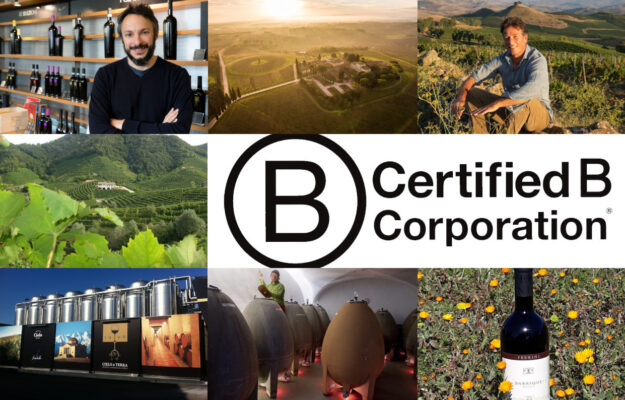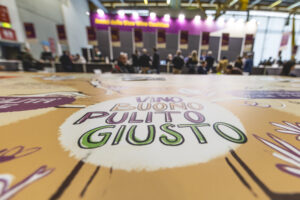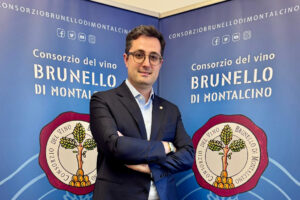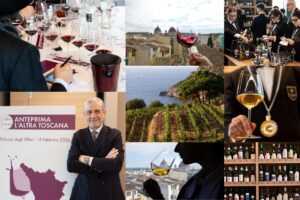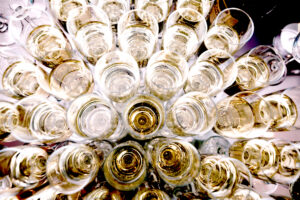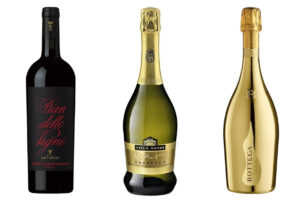7 wineries for 7 different experiences. They are all leading brands and beacons in their territories. Whether small wineries or Cooperatives, these are the examples to follow in the “green” field, and in social sustainability: Perlage Winery, Feudi di San Gregorio, Avignonesi, Tasca d’Almerita, Cielo e Terra, Perrini and Marcel Zanolari. As a matter of fact, according to the B-Lab Italia survey, thanks to these wineries, Italy ranks number one in Europe for the number of companies in the certified B-Corp wine sector, a model that has the strictest regulations in the world. B-Corp certification takes into consideration the relationship companies have with the environment, obviously, as well as with society, employees, suppliers and the territory in general. Italy has a total of 7 companies, meaning it boasts 30% of B-Corps wine companies in Europe (23 companies in total), and 10% of the companies around the world (72 wineries); more than France and Denmark, which count 6 and 3 B-Corps, respectively. The certificate confirms their virtuosity in terms of sustainability. In 2023, Perlage Winery, Feudi di San Gregorio, Avignonesi, Tasca d’Almerita, Cielo e Terra, Perrini and Marcel Zanolari generated more than 125 million euros in aggregate turnover. They belong to a movement which, to date, has 309 B-Corps in Italy, in all sectors, employing over 29.000 people, and generating more than 15.5 billion euros in turnover. In the wine sector, B-Corps stand out not only because of their excellent productions, but especially due to their commitment to sustainability and social responsibility, finding technological innovation in the environment to start promoting a real and positive change in the supply chain. One of the most virtuous examples is Perlage Winery, which has saved over a ton of conventional packaging material, thanks to creating a stretch fiber material, and reduced Co2 emissions 214 tons, by producing lighter bottles. Feudi di San Gregorio, in Irpinia, led by Antonio Capaldo, has instead distinguished itself by using 100% electricity from renewable sources, and 40% is self-produced from photovoltaic systems. Furthermore, the company has developed and implemented lower and lower impact cultivation methods, adopted more sustainable packaging components, and organized social projects. The Avignonesi winery, the jewel of Vino Nobile di Montepulciano, has planted indigenous trees and plants to protect the vines and local biodiversity. It is also implementing circular economy solutions for packaging aimed at increasing the percentage of recycled and recyclable materials. Tasca D’Almerita, one of Sicilian wine’s historic names, led by Lucio Tasca, thanks to reducing the weight of its bottles, has avoided 8.54 tons of CO2 emissions, while also increasing the surface area dedicated to natural, uncultivated areas, lakes, streams and woods, by 13%. It has also encouraged the creation of “SOStain”, the first sustainability program in Sicilian viticulture. Perrini, an organic farm in Puglia, in Castellaneta, also raises free-range animals to fertilize naturally, supports suppliers and local communities and adheres to the Wine-Aut solidarity project for autistic children. Marcel Zanolari Winery, a small producer in Valtellina, is abandoning monoculture and introducing synergistic plant species to the soil to make the vineyards healthier and produce higher quality wines, in addition to using biodynamic and natural preparations as an alternative to pesticides and fertilizers. Another one of the “Magnificent 7” is Cielo e Terra, a historic name of the Colli Berici Cooperative in Veneto. Since 2017 it has been powered exclusively by electricity from certified renewable sources, demonstrating a concrete commitment to sustainability. Over the past five years, the company has recovered more than 45 thousand cubic meters of water, equivalent to the annual consumption of approximately 250 families, and has reduced waste production by 10% compared to 2022, decreasing waste by approximately 40 tons. All the company’s waste is destined for recovery and recycling operations, emphasizing their commitment to circular management of materials. Thanks to these results, Cielo e Terra has been confirmed the winery that has the highest turnover to be Zerowaste and the best Water Footprint (WFP) among the Viva certified wineries. Starting in 2025, the company will only use FSC certified materials, further strengthening its sustainable and responsible approach. Obtaining the B-Corp Certification is a growing phenomenon in the wine sector, at the global level. From 2022 to today, the supply chain has registered 43% increase in the number of certifications in Italy, and 60% in Europe and worldwide. There are another 16 companies in Italy that have decided to approach the B-Corp model and measure their performance through the B-Impact Assessment (BIA). Moreover, two companies are already on the Certification path for 2025. Together with the 7 B-Corps, therefore, there are 25 Italian wine companies that are measuring their performance utilizing B-Lab ESG standards. In addition to the positive impact on the environment and the community, the B-Corp Certification also brings positive economic outcomes. Turnover growth is an essential part of the B-Corp model, as demonstrated in a recent study carried out by the Research Department of Intesa Sanpaolo, in collaboration with B Lab Italia. According to the study, in 2022, the turnover trend of these companies showed +32.4% growth in median terms compared to 2019, higher than the +19% that non-B-Corp companies registered. “The wine sector”, Anna Puccio, Managing Director of B-Lab Italia, commented, “is the flagship of Italian economy and of our cultural identity. B-Corp companies that operate in this supply chain are the personification of savoir faire, and represent virtuous models, creating value and generating positive impacts for the natural ecosystem, the environment, the communities and the people who work there. These companies have chosen to merge innovation and sustainability, embracing the B-Corp philosophy by engaging in various actions for sustainable viticulture, such as reducing the use of pesticides, as well as protecting and enhancing their territory. We at B Lab Italia celebrate and support these companies that stand out for their attention to regenerative practices, an aspect that represents the essence of Made in Italy”.
Copyright © 2000/2026
Contatti: info@winenews.it
Seguici anche su Twitter: @WineNewsIt
Seguici anche su Facebook: @winenewsit
Questo articolo è tratto dall'archivio di WineNews - Tutti i diritti riservati - Copyright © 2000/2026










